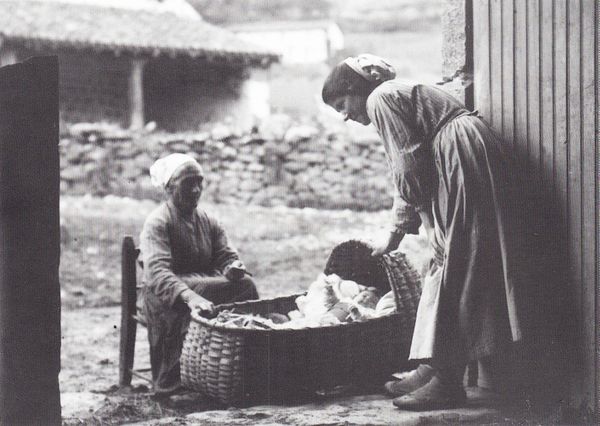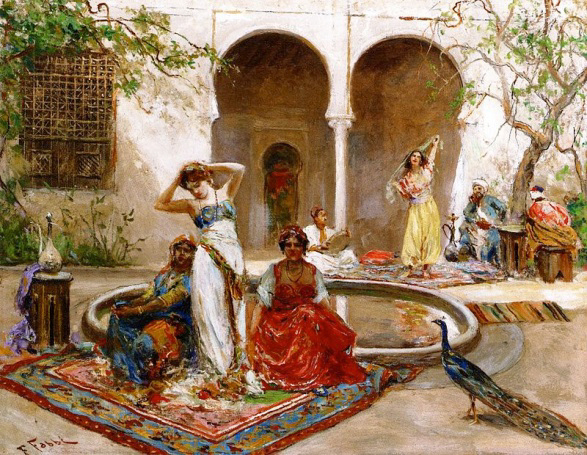miércoles, 19 de abril de 2023
SUEÑOS INFANTILES
lunes, 17 de abril de 2023
"AUTO-EUTANASIA" O UNA MODESTA PROPOSICIÓN PARA RESOLVER EL PROBLEMA DE LAS PENSIONES EN ESPAÑA
PARECIDOS RAZONABLES E IGUALDAD DE GÉNERO
domingo, 16 de abril de 2023
GALLINAS ET HOMINES IN MASCULINUM SEXUM FUISSE
¿Conocían ya los romanos la posibilidad del transgénero? - No. Aunque encontremos esta frase en Civitate Dei, que nos sorprende. La AI viene en nuestra ayuda y cuando se le pregunta por la fuente de esta frase nos informa que:
"El autor latino que escribió "Gallinas et homines in masculinum sexum fuisse" fue Servio, un gramático y comentarista de Virgilio del siglo IV d.C. Esta frase se encuentra en su comentario al libro IV de la Eneida, donde explica el uso del género gramatical en latín. Servio cita esta frase como un ejemplo de una opinión errónea atribuida a Aristóteles, según la cual las gallinas y los hombres habrían sido originalmente del género masculino. Servio rechaza esta idea y afirma que el género de los nombres depende de la naturaleza, la costumbre o la arbitrariedad. Servio es uno de los autores más importantes para el estudio de la gramática latina antigua y de la literatura virgiliana."
domingo, 9 de abril de 2023
CUIDAR A UN NIÑO PEQUEÑO.
viernes, 7 de abril de 2023
DEPRESIÓN, AMOR E HIPERESTESIA
DE NIÑA A MUJER ...
Let's see how we can write, softly and
tenderly, about the arrival of maturity in the body of a woman... or three. Not
like Julio Iglesias. Let's hear from W. Irving in The Legend of the Three
Beautiful Princesses.
"Is there on earth a more noble being than
that knight dressed in crimson?" exclaimed Zaida, the eldest of the
sisters. "Look at his arrogant stride, as if all those around him were his
slaves!" "Look at that green dress!" cried Zoraida. "How
graceful! How charming! What spirit!" Beautiful Zorahaida said nothing,
but secretly gave her preference to the knight dressed in blue.
The three princesses continued to stare fixedly
at the prisoners until they disappeared from view; then, sighing sadly, they
turned, looking at each other for a moment, and sat pensively on their
ottomans.
In this attitude they were found by the
discreet Kadiga. They told her what they had seen, and even the withered heart
of the dueña was moved.
"Poor young men!" she exclaimed.
"I would bet that their captivity has left the hearts of some beautiful
and noble ladies of their country sore! Ah, my daughters! You have no idea of
the life those knights lead in their homeland. What elegance in tournaments!
What devotion to their ladies! What serenades and gallantry!"
Zaida's curiosity was aroused to the extreme;
she was insatiable in asking and hearing from her dueña's lips the liveliest
descriptions of the episodes of her youth in her homeland. Beautiful Zoraida
lifted her head and discreetly looked at herself in her mirror when the
conversation turned to the charms of Spanish ladies, while Zorahaida choked
back her sighs as she listened to the tales of moonlit serenades.
Every day Zaida renewed her questions, and
every day the discreet dueña repeated her tales, listened to by her beautiful
listeners with profound interest and frequent sighs. The prudent old woman
finally realized the damage she was causing. Accustomed to treating the
princesses like children, she had not considered that they had been growing
imperceptibly and that she now had three beautiful young ladies of marriageable
age before her. "It is time," she thought, "to warn the
king."
One morning, Mohamed the Left-Handed was
sitting on a divan in one of the cool halls of the Alhambra, when a slave from
the fortress of Salobreña arrived with a message from the prudent Kadiga,
congratulating him on the birthday of his daughters. At the same time, the
slave presented the monarch with a delicate basket adorned with flowers, inside
of which, on a bed of grape leaves and fig leaves, were a peach, an apricot,
and a plum, whose freshness, pleasing color, and ripeness were a real
temptation.
The monarch, versed in the oriental language of
fruits and flowers, immediately guessed the meaning of this symbolic offering.
"So," he said to himself, "the critical period foretold by the
astrologers has arrived: my daughters are of marriageable age. What shall I do?
They are hidden from the eyes of men and under the custody of the discreet
Kadiga. Everything is going perfectly; but they are not under my watchful eye,
as the astrologers warned; I must gather them under my wings and not entrust
them to anyone."
jueves, 6 de abril de 2023
ALGUNOS GENES ...
(Traducción con AI)
Reading the famous Tales of the Alhambra by Irving, in his
story "The moor's Legacy," we will eventually learn the fate of the
Moor and the water-carrier who find a treasure.
"The moor returned to Africa, to Tangier, his hometown,
and the galician man headed to Portugal with his wife, children, and donkey.
There, with the guidance and advice of his wife, he became an important figure,
as she dressed up her worthy little man in a doublet, breeches, a feathered
hat, and a sword at his waist, abandoning the family name of Perejil and
adopting the more resonant one of Don Pedro Gil. His offspring grew with
robustness and joy, though all of them of short stature and bow-legged; meanwhile,
Señora Gil, covered in fringes, brocade, and lace from head to toe, with
sparkling diamond earrings on all her fingers, became a model of gaudy
elegance."
P.S. The painting is "The Patizambo" by José de
Ribera. It depicts a Neapolitan beggar with his cane and a paper that says
"an alms, for the love of God."


.jpg/783px-Inupiat_Family_from_Noatak%2C_Alaska%2C_1929%2C_Edward_S._Curtis_(restored).jpg)


.jpg)





.jpg/800px-Canestra_di_frutta_(Caravaggio).jpg)
